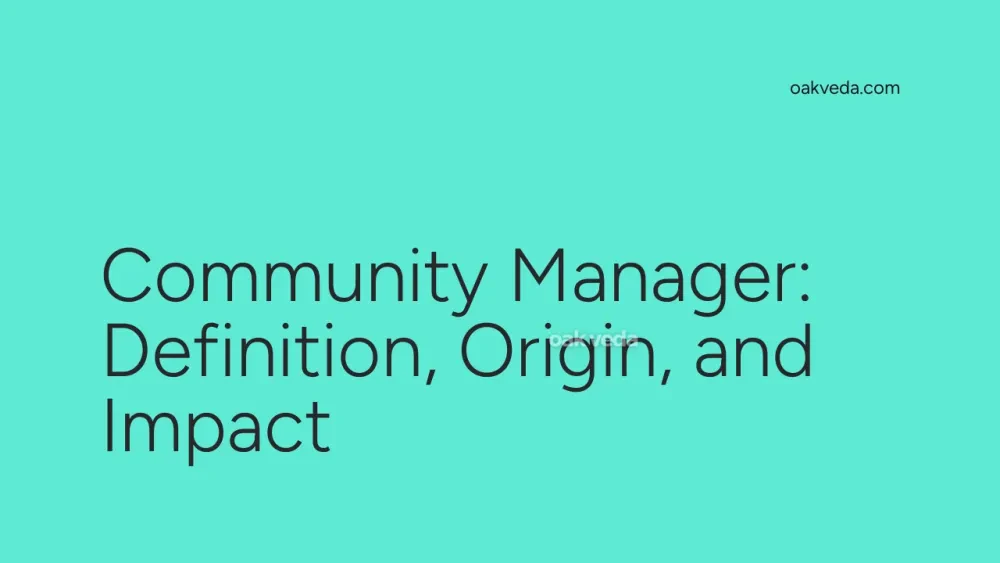
What is a Community Manager?
A community manager is a professional responsible for building, nurturing, and managing an organization's online presence across various social media platforms. They act as the bridge between a brand and its audience, fostering meaningful relationships and creating a sense of community among followers, fans, and customers.
Origin and Development of Community Management
The concept of community management emerged in the early 2000s with the rise of online forums and discussion boards. As social media platforms gained popularity, the role evolved to encompass a broader range of responsibilities. Today, community managers are integral to a brand's digital strategy, playing a crucial role in shaping public perception and driving engagement.
How Community Management Works
Community managers employ various strategies to cultivate a thriving online community:
- Content Creation and Curation: Developing and sharing engaging, relevant content that resonates with the target audience.
- Engagement: Responding to comments, messages, and mentions promptly and authentically.
- Moderation: Ensuring discussions remain positive and productive by managing conflicts and removing inappropriate content.
- Social Listening: Monitoring conversations about the brand and industry to gather insights and identify trends.
- Advocacy: Promoting the brand's values, products, and services while maintaining a genuine connection with the community.
Types of Community Management
Community management can be categorized into several types:
- Social Media Community Management: Focusing on platforms like Facebook, Twitter, Instagram, and LinkedIn.
- Forum Management: Overseeing discussions on dedicated brand forums or third-party platforms.
- Product Community Management: Building communities around specific products or services.
- Internal Community Management: Fostering engagement and collaboration among employees within an organization.
Popular Examples of Effective Community Management
- Airbnb: Their community managers create a sense of belonging among hosts and guests, sharing user-generated content and fostering connections.
- Glossier: The beauty brand's community managers engage with customers on social media, incorporating feedback into product development.
- Lego Ideas: This platform allows fans to submit and vote on new Lego set ideas, with community managers facilitating discussions and updates.
Impact of Community Management on Social Media Culture
Community management has significantly influenced social media culture by:
- Humanizing brands and creating more authentic connections with consumers
- Encouraging user-generated content and brand advocacy
- Shifting the focus from one-way communication to interactive dialogues
- Providing real-time customer support and issue resolution
- Fostering brand loyalty through consistent engagement and personalized interactions
Controversies and Debates Surrounding Community Management
While community management offers numerous benefits, it also faces challenges:
- Privacy Concerns: Balancing personalization with user privacy protection
- Authenticity vs. Brand Voice: Maintaining a consistent brand voice while being genuine and relatable
- Handling Negative Feedback: Addressing criticism transparently without damaging brand reputation
- Burnout: Managing the demands of 24/7 online presence and emotional labor
How Brands and Influencers Use Community Management
Brands and influencers leverage community management to:
- Build and maintain a loyal following
- Gather valuable customer insights and feedback
- Increase brand awareness and reach through word-of-mouth marketing
- Improve customer satisfaction and retention
- Drive traffic and conversions through targeted engagement
Future Trends in Community Management
The future of community management is likely to be shaped by:
- AI and Automation: Integrating chatbots and AI-powered tools for more efficient engagement
- Virtual and Augmented Reality: Creating immersive community experiences
- Niche Communities: Focusing on smaller, more targeted groups for deeper connections
- Data-Driven Strategies: Utilizing advanced analytics to inform community management decisions
- Cross-Platform Integration: Managing communities seamlessly across multiple platforms and channels
FAQs about Community Management
-
What skills are essential for a community manager? Strong communication, empathy, crisis management, content creation, and analytical skills are crucial.
-
How is community management different from social media marketing? While social media marketing focuses on promoting products or services, community management emphasizes building relationships and fostering engagement.
-
Can community management improve customer retention? Yes, by creating a sense of belonging and addressing customer needs promptly, community management can significantly enhance customer loyalty and retention.
-
How do you measure the success of community management efforts? Key metrics include engagement rates, sentiment analysis, community growth, customer satisfaction scores, and conversion rates.
-
Is community management necessary for small businesses? While the scale may differ, community management can benefit businesses of all sizes by fostering customer relationships and building brand loyalty.
In conclusion, community management has become an indispensable aspect of modern digital marketing strategies. By fostering genuine connections, addressing customer needs, and creating a sense of belonging, community managers play a vital role in shaping a brand's online presence and driving long-term success in the digital landscape.
You may be interested in:
- Stitch: Definition, Origin, and Impact on TikTok
- Watch Time: Definition, Origin, and Impact on YouTube Success
- ROI in Marketing: Definition, Origin, and Impact
- CPC (Cost-Per-Click): Definition, Origin, and Impact
- Koji: Definition, Origin, and Impact on Social Media
- IMO: Definition, Origin, and Impact on Social Media

